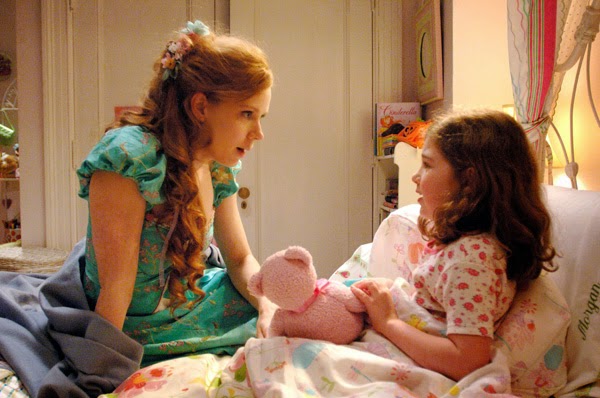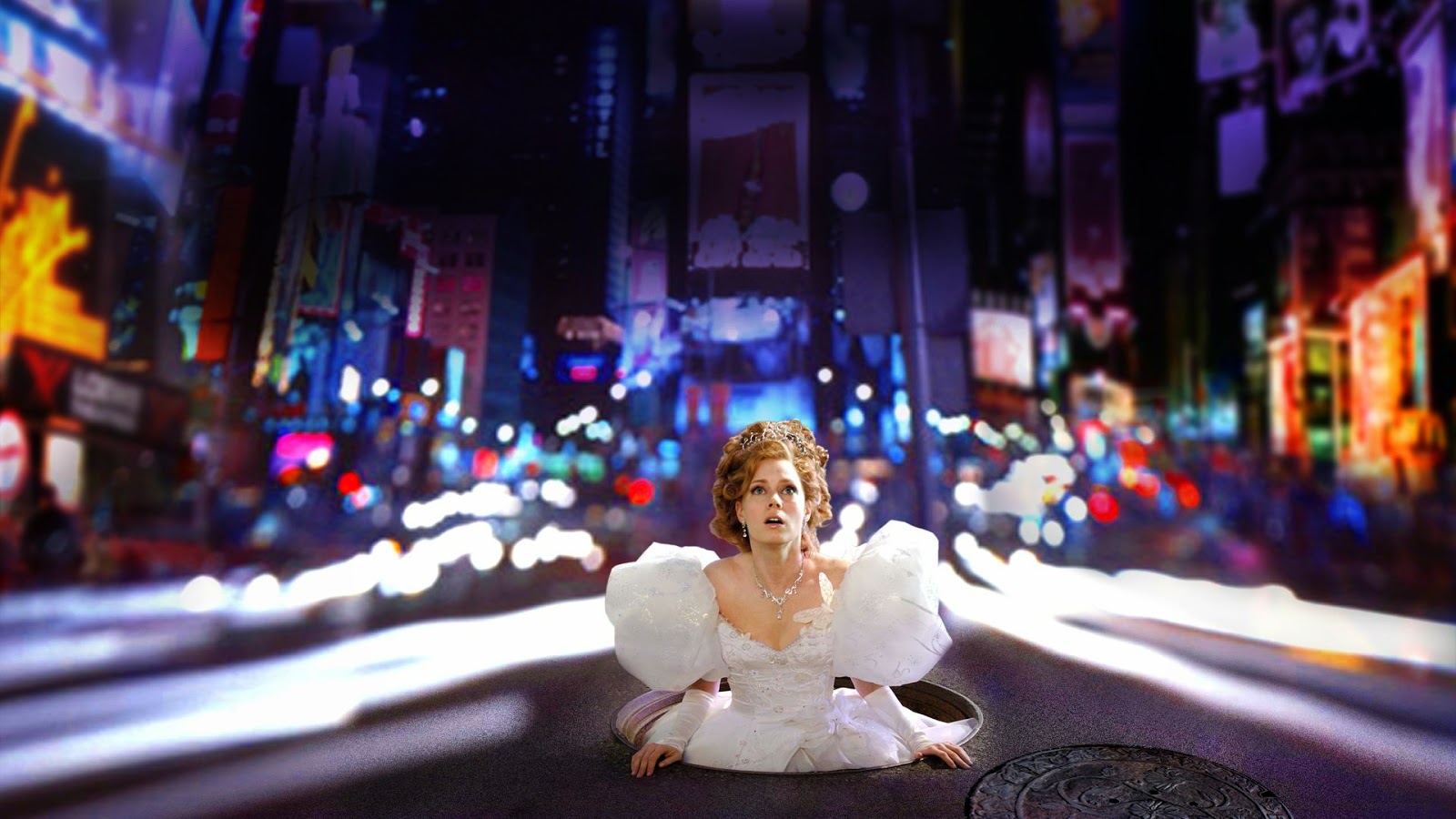Okay, full disclosure to start us off here: I totally am stealing this entire article idea from a post I saw on tumblr. Sue me. But I was looking at this collection of gifs again yesterday afternoon, because it's a post that has been circling the internets for a while, and I realized that it really encapsulates everything I love about Enchanted in one handy, easy to read place.
I mean, yes, there are other things I love in it, like how inventive the film is, how much fun it has playing with the form, the whole idea of fairytale romance being unhealthy and the more messy human relationships actually being better for their increased depth, but this is probably my favorite part of the movie. I love that Giselle, Disney Princess Giselle, thinks everyone is beautiful.
It's not one of the main themes of the movie, but it does come up a fair amount. For the sake of argument here, I'm going to assume that all of you have seen Enchanted at some point and are roughly familiar with the plot. If you aren't, I'm not going to take the time to explain it today, so you can read up here.
As we come into the film, for the first twenty minutes or so, Giselle (Amy Adams) is more or less what we expect from a Disney Princess protagonist. She's lovely, inside and out, a little naive and very sweet. Badness befalls her because she instinctively trusts everyone around her, and her reactions to the brave new world of New York City are exactly what you expect them to be. Nothing new or newsworthy so far.
The moment I realized that Giselle was something different actually came around the half hour mark of the film, when Giselle, having been taken in by Robert (Patrick Dempsey) and his daughter Morgan (Rachel Covey), takes a shower for the first time ever. It goes about as well as can be expected and leads to Giselle and Robert being in an unfortunately compromising position when his girlfriend, Nancy (Idina Menzel) walks in.
Nancy is pretty unthrilled to find her boyfriend pinned down by a semi-naked woman, but that ire turns to sheer confusion when Giselle is just so incredibly thrilled to meet her. Like, over the top excited to meet Nancy. Nancy, who is a brass tacks New York kind of woman, is pretty uncomfortable with all this hoopla and quickly leaves. It's as Nancy is leaving and Giselle is watching her go that we get to hear what Giselle really thinks of Nancy, and it is, simple, "Oh, she's lovely!"
And I know that sounds pretty basic and not noteworthy, but the thing is, it is noteworthy. It's worthy of note because it's incredibly rare for two women, especially in a Disney Princess movie, to view each other with that kind of appreciation and joy. It's important because right off the bat it makes it clear that this movie is absolutely not going to devolve into a catfight between the two of them for Robert. It refuses to be that base. Instead, we're going to get a narrative about two women respecting the hell out of each other and building a friendship based on mutual appreciation. Awww yeah.
So that's pretty good to start with, but it gets even better when, later that morning, Robert walks Giselle to his law firm so he can look her up and hopefully send her back home. As they're walking, Giselle gets distracted staring at a statue, and when Robert asks her why, she tells him that the woman in the statue is just so beautiful!*
Again, seems innocuous, until you realize that the statue in question is a very large fertility icon, rendered in bronze (I think). The woman in the statue isn't your average "Classical beauty", with the toned limbs and athletic stance of Graeco-Roman statuary, or the elongated form of Egyptian art, or even a modernist interpretation of either. Nope, it's a fertility icon, a statue of a woman with enormous breasts and a huge butt, giant thighs tapering down to little feet and a generous belly hanging above it all. And Giselle takes one look at it and is fixated by how beautiful it is.
Hell yes.
Then, at the law firm later, Giselle is supposed to be waiting quietly, but that's basically impossible for her, and when she sees a client come over, she has to say something. The women, who is African-American, middle-aged, and currently going through a divorce (hence why she's visiting her divorce attorney), is a bit dubious about going over to talk to the crazy lady by the window, but obliges. Giselle just can't help blurting out that she loves the woman's hair (which is done in gorgeous curling braids) and that she thinks this woman is absolutely stunning.
We as the audience get to watch this woman's whole face change as she realizes that Giselle means it completely. Wholeheartedly. And this woman, who was having a pretty rough day up to this point, suddenly feels beautiful and loved and delighted in. She lights up. And then Giselle saves her marriage and makes her very very happy and it's honestly almost painfully wonderful to watch.
There are more scenes like this too. In the park, Giselle sings a song about making sure that people know you love them, and in part of her song she tells a bunch of elderly women how lovely they are and invites them to get up and dance. She frolics in fields and shows women of all colors and shapes and sizes and backgrounds exactly how gorgeous she finds them. Because Giselle genuinely believes that every single woman, no matter what, is beautiful. And every man is handsome. No arguments.
Sure, there's something a little disingenuous about having the message of the film be how gorgeous every single woman is when the protagonist is an incredibly conventionally attractive white woman with pale skin, a flat stomach, and big blue eyes. But in a weird way, I actually appreciate it more for that fact. Hear me out. Because Giselle is exactly what we consider the standard of beauty, it makes it feel more significant that she keeps trying to share it.
You know? Because Giselle is considered beautiful, her awareness of others' beauty feels unforced and honest. She's not aware of people being beautiful because she's consciously fighting a beauty standard but because she just really finds everyone beautiful. It's a case of a woman using her privilege in exactly the right ways. And it's great.
What makes it even better, though, for me at least, is the fact that this movie is a kids' movie. I mean, there's really no question about that. It's a movie with a comedic chipmunk sidekick and a heroine who makes dresses out of curtains unironically. It's a movie for children. And it's a movie for children where the protagonist goes out of her way to make sure that all the women she meets feel appreciated, loved, and cherished. Talk about sending good messages!
In a very real sense, I think this aspect of the movie hits me so hard because it doesn't actually have to be there for the film to make sense. It has nothing to do with the plot, and as we can tell from the lack of this in most other Disney films, it's not really something the studio finds necessary to the telling of a good story. Sadly. So its inclusion here means something. It means that the writers, director, and actors were all making a statement about how every woman is beautiful and how every woman should know how beautiful she is.
I get really frustrated with Disney movies sometimes. A lot of the time. Most of the time. And by and large I don't come down favorably on the whole Disney Princess thing. But this is my exception. I love this movie. It's the kind of film I will happily show my future children, because I think that the messages it sends are good and valid and worth learning.
I want my children and every child really to know that a woman is beautiful simply because she exists and that beauty is in the eye of the beholder, so behold it everywhere. I want my kids to know that and to live their lives like Giselle does, full in the knowledge of how loved and cherished they are, and ready to bestow that on others.
Because, and that's the key here, the reason Giselle is so comfortable telling every single woman she meets how beautiful she is, is because Giselle herself knows exactly how beautiful she is. Not in a snooty or self-involved way, but in the confident, happy way we all want. The simple knowledge that she is beautiful allows her to see that everyone else is too. And man do I want that, for me and for my children.
Giselle is the hero of this movie, and as such she's the one that every little kid watching wants to be. With great power comes great responsibility, and for once it's so wonderful to see a movie where that responsibility is taken seriously. Kids learn what we teach them, consciously and unconsciously. How happy, then, to see a movie that teaches them to love each other well.
 |
| Unfortunately, I'm usually more of a Robert in these situations. |






It's particularly cool that they choose the live action one to do this.
ReplyDeleteYes! Because it has even more impact when we can see the real people who are being called beautiful.
DeleteRUSSIAN ESCORT
ReplyDeleteRUSSIAN ESCORTS
RUSSIAN CALL GIRL
RUSSIAN CALL GIRLS
HOUSEWIFE ESCORT
HOUSEWIFE ESCORTS
HOUSEWIFE CALL GIRLS
HOUSEWIFE CALL GIRL
MODEL ESCORT
MODEL ESCORTS
COLLEGE CALL GIRL
COLLEGE CALL GIRLS
INDEPENDENT ESCORT SERVICE
INDEPENDENT ESCORTS SERVICE
INDEPENDENT ESCORTS SERVICES
INDEPENDENT CALL GIRL
INDEPENDENT CALL GIRLS
ESCORT
ESCORTS
FEMALE ESCORTS SERVICE KOLKATA
KOLKATA FEMALE ESCORTS SERVICE
INDEPENDENT ESCORTS SERVICE
INDEPENDENT ESCOTRTS SERVIC KOLKATA
KOLKATA INDEPENDET ESCORTS SERVICE
RUSSIAN ESCORTS SERVICE KOLKATA
RUSSIAN ESCORTS SERVICE
KOLKATA RUSSIAN ESCORTS SERVICE
FOREIGN ESCORTS SERVICE IN KOLKATA
INDEPENDEN FOREIGN ESCORTS SERVICE
ESCORT FOREIGN SERVICE IN KOLKATA
SEXY FEMALE ESCORTS SERVICE
SEXY MODEL ESCORTS SERVICE